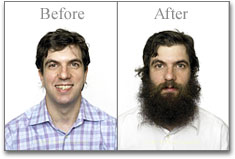Thou Shalt Not What?
A. J. Jacobs on his yearlong quest to obey every Biblical rule

When A. J. Jacobs decided to dive headfirst into biblical living, he first jotted down the rules he had to follow. Some, like loving thy neighbor, growing a beard, and following the Sabbath, were straightforward. Tithing his wages and stoning adulterers proved a bit trickier.
In The Year of Living Biblically: One Man’s Humble Quest to Follow the Bible as Literally as Possible, published this month by Simon & Schuster, Jacobs takes readers on a humorous and reverent journey, as he tries to follow the more than 700 biblical rules. Not only did he grow a beard and avoid clothing with mixed fibers, he also embedded himself in other religious groups — from the Amish to snake handlers.
BU Today asked Jacobs, who grew up in a secular home without religious observations, about his spiritual quest.
“I’m Jewish in the same way that the Olive Garden is Italian,” he says. “The closest my family came to observing Judaism was that paradoxical classic of assimilation: a Star of David on top of our Christmas tree.”
Jacobs will talk about his book on Thursday, November 1, at 7 p.m. at Barnes & Noble at Boston University, 660 Beacon St., in Kenmore Square.
BU Today: Did you have a vision compelling you to write this book, the way God told Noah to build an ark?
Jacobs: I wanted a vision. I wished that I had one. But there was none of that. I talk about my Uncle Gil in the introduction of the book because he kind of inspired me, even though he’s the black sheep of the family. He’s a fascinating man. He tried every religion and also tried living biblically. So I thought I’d try it, too.

What is the hardest biblical rule to obey each day?
Coveting. I covet anything that Macintosh comes out with. Steve Jobs is always there in my life, coming up with new gadgets. I learned some techniques during the year of living biblically, but it’s still a struggle.
Can you share one of those techniques?
If you’re coveting something, one method you can try is to really focus on the things that you already have. I try to be thankful for the hundred little things that go right every day that I don’t even notice.
What were some reactions to your appearance?
I definitely got a wide range of reactions to my beard. They called me everything from Gandalf to Abe Lincoln and Ted Kaczynski. People would pet my beard for no reason, which was disconcerting. It was a mix of either very positive or very negative reactions. Some people would cross the street to avoid having to pass me on the sidewalk. Other people suddenly felt reverent in my presence and would say they couldn’t curse or gossip or lie in front of me.
There are a few rules in the Bible applying to women that are not generally accepted today. How did your wife feel about them?
There was a definitely a mix. On one hand, since I’m a workaholic, she loved that I had this day of rest and that I’d become more appreciative and spiritual. But she didn’t love the rules about not touching women during their time of the month. In the Bible, it says you can’t sit on a seat where a menstruating woman has sat. So she would go around the house and sit on every seat in the house. Basically, I had to stand for much of the year.
But my wife is an angel and a saint for putting up with my book The Know-It-All, on reading the Encyclopaedia Britannica from A to Z, and then this book. She says my next book is supposed to be just a year of loving her. Don’t know if my publisher will go for that.
What has changed as a result your year of living biblically?
Well, I started wearing clothes of mixed fibers again. Actually, a lot carried over, because this project had a huge impact on me. I still practice the Sabbath, which means I take a day of rest and reflection or give thanks. One of my favorite things about the Bible is the gratefulness and the prayers of thanksgiving.
If you could go back in time, would you want to live during biblical times?
I love parts of the Bible and the biblical mindset, the stress on community and respecting your elders. But as far as living then goes, they had things like leprosy and plagues. I think I prefer my modern life.
How would you fare living by the Good Book? Vote here.
Kimberly Cornuelle can be reached at kcornuel@bu.edu.